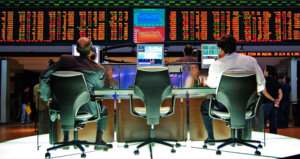Time to pay attention to S&P – but not for the usual reasons!
As companies across the markets begin to massage their creditworthiness, the stock market indices are set to be come a very volatile and very different place

In recent history, there has never been a time during which the business environment in every sector of industry in every region of the world has changed so rapidly as over the past few weeks.
Further, and likely much larger changes are still to come, and therefore, as expected, the way companies and their stocks are valued, and the way that tradeable assets on the electronic market interact with buyers and sellers is absolutely no exception.
North American ratings agency Standard & Poor has been for many years used as a yardstick among traders, the company’s ubiquitous S&P 500 index being a mainstay within those trading company stock, as the S&P 500 exists as a stock market index that measures the stock performance of 500 large companies listed on stock exchanges in the United States. It is one of the most commonly followed equity indices, and many consider it to be one of the best representations of the U.S. stock market.
As businesses have been forced to close or face draconian action by the first global attempt at dictatorship in human history, corporate disempowerment has surfaced across all sectors of business, from small enterprises to large conglomerates in every nation worldwide and as a result, with no lifeline available to any of them, and the prohibition to return to operational status, many are turning to bond-buying schemes and applying en masse.
This drive has been spearheaded by large companies in the United Kingdom, which have begun to undertake extreme measures to obtain credit ratings that would allow them access to the Bank of England’s bond buying scheme that has been put in place because of the coronavirus shutdowns.
Standard & Poor’s international rating agency division, S&P Global Ratings has received approximately 30 inquiries from British companies which are attempting to be rated “investment grade” so as to be able to access the BoE’s covid corporate financing facility (CCFF).
As we all know, there is no magic ‘bailout’ for businesses that have been ordered to close their doors, the order being a one way street insofar as that governments get heavy handed with anyone attempting to open their business during this period, yet will leave all companies and employees high and dry as a result.
The British government proudly introduced a £330 billion business support package, with the smiling Chancellor telling people not to worry, however really it is a virtually unobtainable loan on high interest with sub-prime firms underwriting it. Called the Coronavirus Business Interruption Loan Scheme (CBILS), it has 40 lenders which are listed on the British Business Bank’s site, however any husiness that has sustained losses due to the forced shutdowns across the world must go through underwriting procedures and meet lending criteria.
What absolute nonsense. Imagine any executive of any company of any size or format calling one of these lenders and asking for a business loan, and when asked what for, the answer would be that the business is failing due to canceled contracts, or closed doors to customers, postponed projects and zero cash flow. Hmmm, yes. The underwriters are going to love that, aren’t they.
Therefore, there is pretty much no company that meets such criteria, hence the rally by firms to attempt to massage their credit ratings, which although is being done so that companies can appear more creditworthy to lenders, will in the end have an effect on the markets, because should companies globally (especially if this begins to happen in the United States) end up being measured highly by ratings agencies such as Standard & Poor, they could by default end up on the S&P 500 index, even though they got there by massaging the ratings criteria instead of via corporate strength and performance.
The average annual total return of the index, including dividends, since inception in 1926 has been 9.8%; however, there were several years where the index declined over 30%. The index has posted annual increases 70% of the time and the components that have increased their dividends in 25 consecutive years are known as the S&P 500 Dividend Aristocrats.
The S&P 500 is a capitalization-weighted index and the performance of the 10 largest companies in the index account for 21.8% of the performance of the index, so the figures currently are good.
What may happen to the markets should companies with an unstable future become part of the S&P 500 measurements is clear – extreme volatility, because the ratings of the companies would not necessarily be reflected in their performance in the markets.
S&P, Fitch, Moody’s and DBRS Morningstar all reported an increase in demand for credit ratings from UK firms hoping to access the CCFF.
Ian Linnell, President of Fitch Ratings stated yesterday that interest has risen as the economic picture has worsened. “It’s just been bad news after bad news, so it’s not surprising that momentum or interest around the scheme is building quite rapidly,” he said.
Tej Parikh, chief economist at the Institute of Directors, said: “We’re still hearing reports that money isn’t reaching the frontline as fast as it might.” He added: “It’s vital the government continues to iron out the creases in its support package.”
What with? With the entire world currently out of business, huge industry sectors will never return to the market, and likely close for good. Those looking to get their ratings inline with lending criteria may well continue, but the stock markets will be a very different place as a result, as these are measures and methods that have never been seen before.









